Türkiye's "porcelain capital" sees revival of ceramic heritage
新華網
Editor: huaxia
2025-07-06 19:48:43
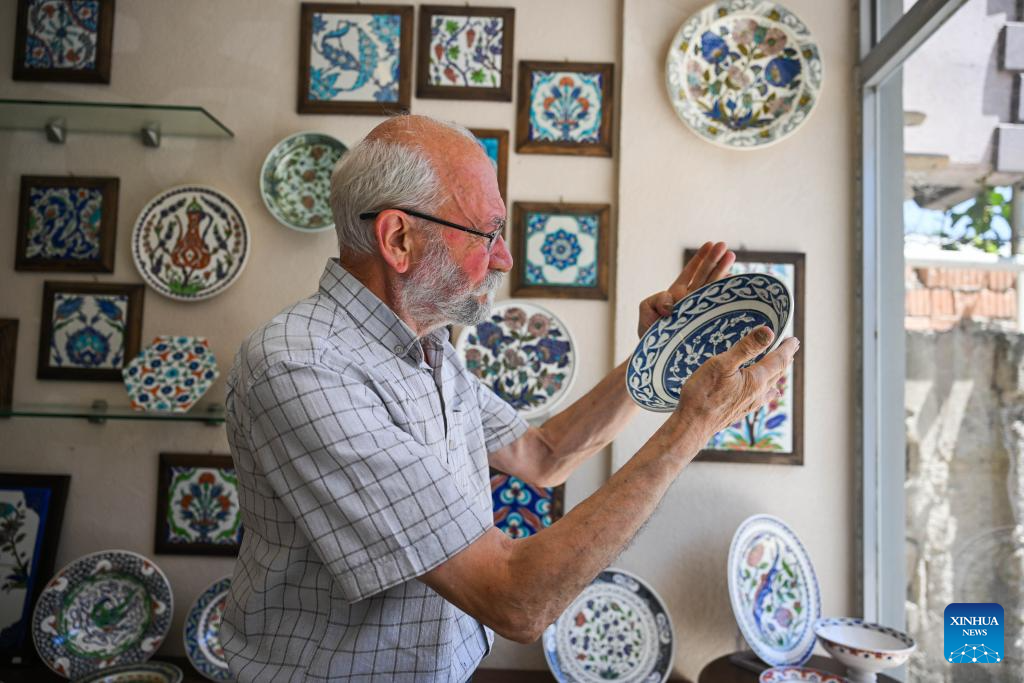
Turkish ceramic artist Adil Can Guven examines one of his blue-and-white porcelain artworks in his studio in Iznik, Türkiye, on June 26, 2025. Walking through the streets of Iznik, Türkiye, one finds ceramic elements everywhere. The clock tower in the city center is adorned with tile murals depicting sailing ships. House numbers on ordinary homes are carefully inscribed on elegant ceramic tiles. Family-run porcelain workshops and ceramic stalls line the streets.
Iznik is known as Türkiye's "porcelain capital." From the 15th to the 17th century, the city flourished as a center for producing blue-and-white porcelain but gradually declined in the following centuries.
In recent years, however, Iznik has been committed to reviving its ceramic heritage and rejuvenating its reputation as Türkiye's "porcelain capital." As part of this effort, Iznik has strengthened exchanges with Jingdezhen, often dubbed China's "porcelain capital."
In 2021, the two porcelain capitals became sister cities, and the Iznik municipal government organized multiple visits to Jingdezhen for study and exchange.
In 2025, Jingdezhen's second official overseas flagship store opened in Türkiye, and the two cities also signed a ceramic industry alliance cooperation agreement. Today, Iznik and Jingdezhen are deepening their ties through ceramics, adding a new layer to the modern story of the Silk Road. (Xinhua/Liu Lei)
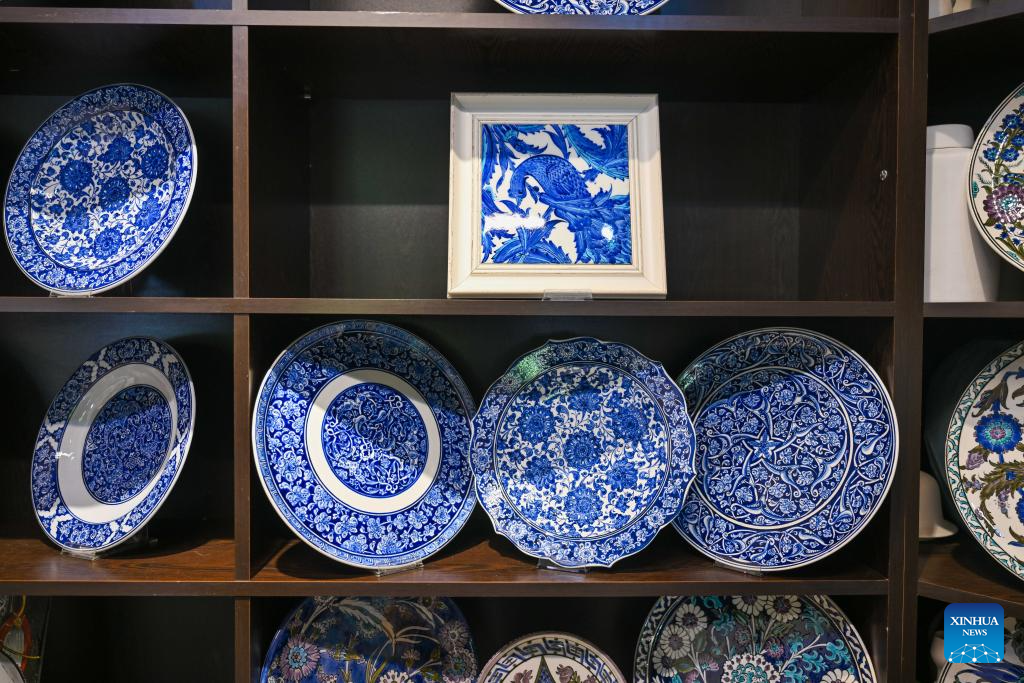
This photo taken on June 16, 2025 shows pocelain ware displayed at the Porcelain Market in Iznik, Türkiye. Walking through the streets of Iznik, Türkiye, one finds ceramic elements everywhere. The clock tower in the city center is adorned with tile murals depicting sailing ships. House numbers on ordinary homes are carefully inscribed on elegant ceramic tiles. Family-run porcelain workshops and ceramic stalls line the streets.
Iznik is known as Türkiye's "porcelain capital." From the 15th to the 17th century, the city flourished as a center for producing blue-and-white porcelain but gradually declined in the following centuries.
In recent years, however, Iznik has been committed to reviving its ceramic heritage and rejuvenating its reputation as Türkiye's "porcelain capital." As part of this effort, Iznik has strengthened exchanges with Jingdezhen, often dubbed China's "porcelain capital."
In 2021, the two porcelain capitals became sister cities, and the Iznik municipal government organized multiple visits to Jingdezhen for study and exchange.
In 2025, Jingdezhen's second official overseas flagship store opened in Türkiye, and the two cities also signed a ceramic industry alliance cooperation agreement. Today, Iznik and Jingdezhen are deepening their ties through ceramics, adding a new layer to the modern story of the Silk Road. (Xinhua/Liu Lei)
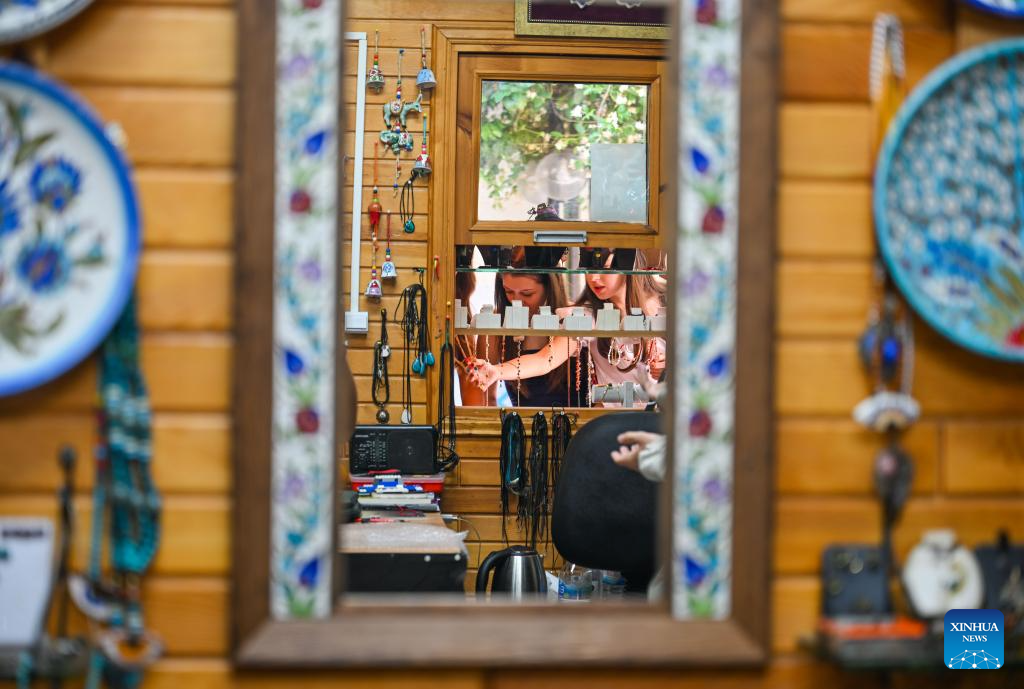
This photo taken on June 16, 2025 shows people visiting the Porcelain Market in Iznik, Türkiye. Walking through the streets of Iznik, Türkiye, one finds ceramic elements everywhere. The clock tower in the city center is adorned with tile murals depicting sailing ships. House numbers on ordinary homes are carefully inscribed on elegant ceramic tiles. Family-run porcelain workshops and ceramic stalls line the streets.
Iznik is known as Türkiye's "porcelain capital." From the 15th to the 17th century, the city flourished as a center for producing blue-and-white porcelain but gradually declined in the following centuries.
In recent years, however, Iznik has been committed to reviving its ceramic heritage and rejuvenating its reputation as Türkiye's "porcelain capital." As part of this effort, Iznik has strengthened exchanges with Jingdezhen, often dubbed China's "porcelain capital."
In 2021, the two porcelain capitals became sister cities, and the Iznik municipal government organized multiple visits to Jingdezhen for study and exchange.
In 2025, Jingdezhen's second official overseas flagship store opened in Türkiye, and the two cities also signed a ceramic industry alliance cooperation agreement. Today, Iznik and Jingdezhen are deepening their ties through ceramics, adding a new layer to the modern story of the Silk Road. (Xinhua/Liu Lei)
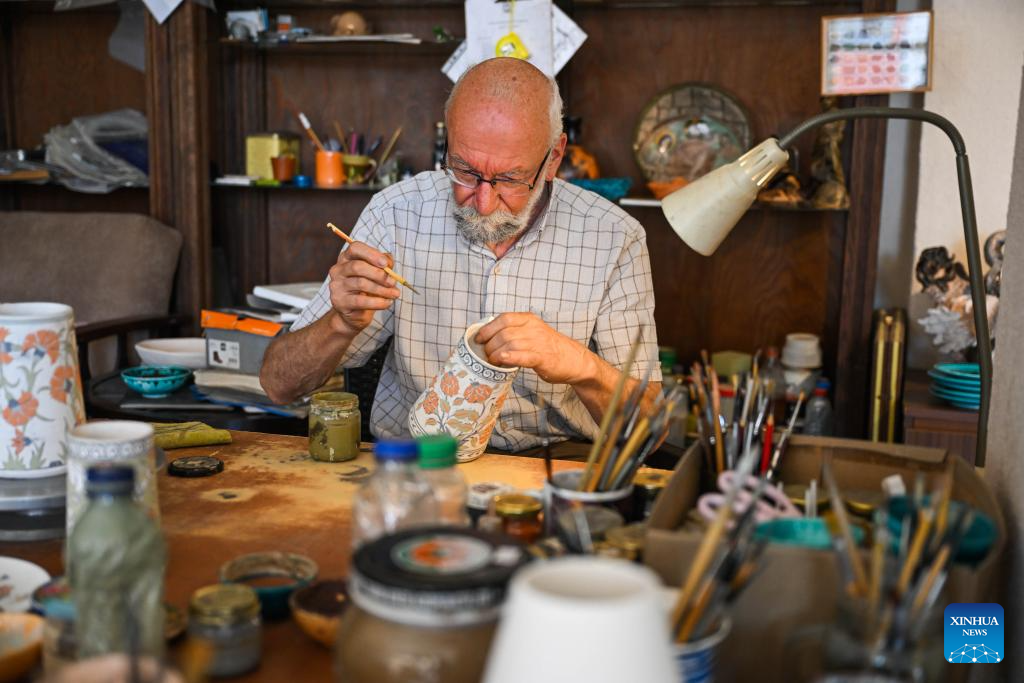
Turkish ceramic artist Adil Can Guven works in his studio in Iznik, Türkiye on June 26, 2025. Walking through the streets of Iznik, Türkiye, one finds ceramic elements everywhere. The clock tower in the city center is adorned with tile murals depicting sailing ships. House numbers on ordinary homes are carefully inscribed on elegant ceramic tiles. Family-run porcelain workshops and ceramic stalls line the streets.
Iznik is known as Türkiye's "porcelain capital." From the 15th to the 17th century, the city flourished as a center for producing blue-and-white porcelain but gradually declined in the following centuries.
In recent years, however, Iznik has been committed to reviving its ceramic heritage and rejuvenating its reputation as Türkiye's "porcelain capital." As part of this effort, Iznik has strengthened exchanges with Jingdezhen, often dubbed China's "porcelain capital."
In 2021, the two porcelain capitals became sister cities, and the Iznik municipal government organized multiple visits to Jingdezhen for study and exchange.
In 2025, Jingdezhen's second official overseas flagship store opened in Türkiye, and the two cities also signed a ceramic industry alliance cooperation agreement. Today, Iznik and Jingdezhen are deepening their ties through ceramics, adding a new layer to the modern story of the Silk Road. (Xinhua/Liu Lei)
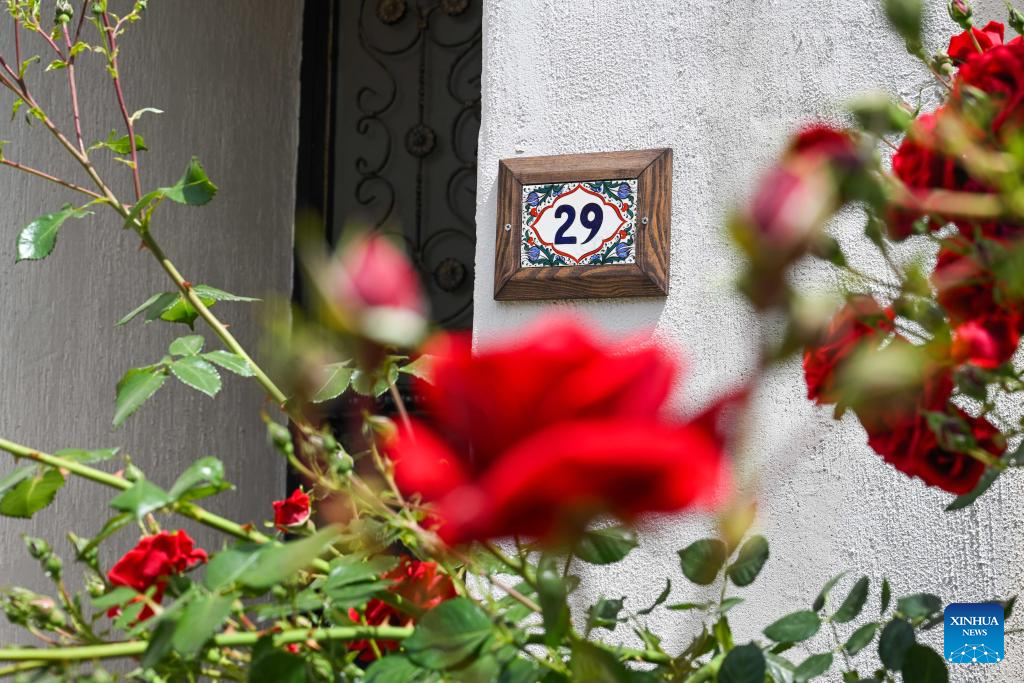
This photo taken on May 9, 2025 shows a house number plate in Iznik, Türkiye. Walking through the streets of Iznik, Türkiye, one finds ceramic elements everywhere. The clock tower in the city center is adorned with tile murals depicting sailing ships. House numbers on ordinary homes are carefully inscribed on elegant ceramic tiles. Family-run porcelain workshops and ceramic stalls line the streets.
Iznik is known as Türkiye's "porcelain capital." From the 15th to the 17th century, the city flourished as a center for producing blue-and-white porcelain but gradually declined in the following centuries.
In recent years, however, Iznik has been committed to reviving its ceramic heritage and rejuvenating its reputation as Türkiye's "porcelain capital." As part of this effort, Iznik has strengthened exchanges with Jingdezhen, often dubbed China's "porcelain capital."
In 2021, the two porcelain capitals became sister cities, and the Iznik municipal government organized multiple visits to Jingdezhen for study and exchange.
In 2025, Jingdezhen's second official overseas flagship store opened in Türkiye, and the two cities also signed a ceramic industry alliance cooperation agreement. Today, Iznik and Jingdezhen are deepening their ties through ceramics, adding a new layer to the modern story of the Silk Road. (Xinhua/Liu Lei)
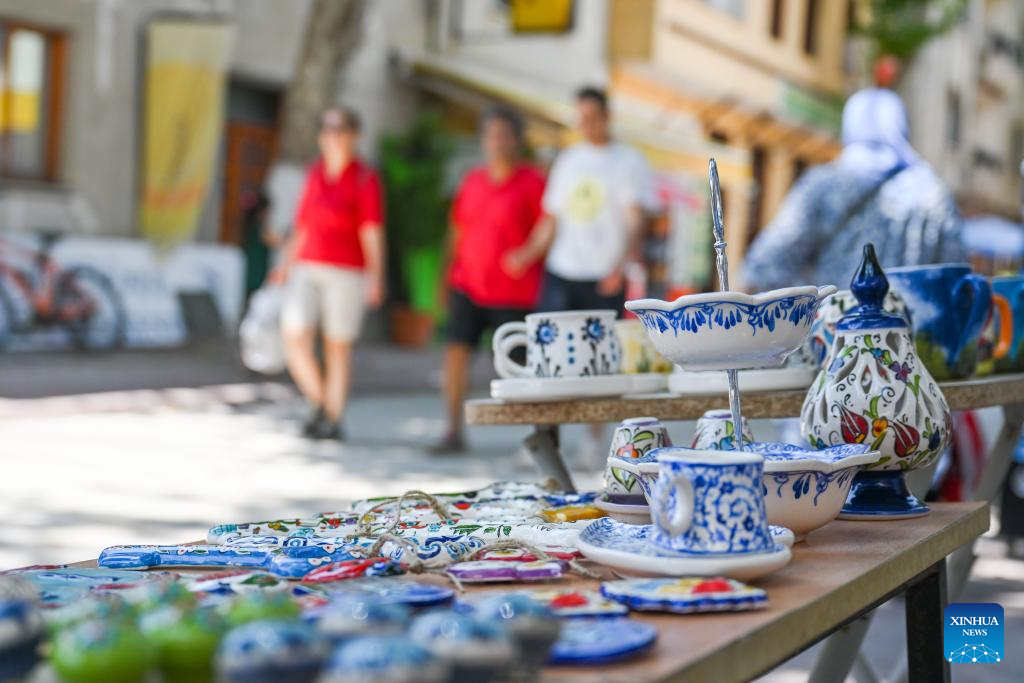
This photo taken on June 16, 2025 shows a porcelain stall on a street in Iznik, Türkiye. Walking through the streets of Iznik, Türkiye, one finds ceramic elements everywhere. The clock tower in the city center is adorned with tile murals depicting sailing ships. House numbers on ordinary homes are carefully inscribed on elegant ceramic tiles. Family-run porcelain workshops and ceramic stalls line the streets.
Iznik is known as Türkiye's "porcelain capital." From the 15th to the 17th century, the city flourished as a center for producing blue-and-white porcelain but gradually declined in the following centuries.
In recent years, however, Iznik has been committed to reviving its ceramic heritage and rejuvenating its reputation as Türkiye's "porcelain capital." As part of this effort, Iznik has strengthened exchanges with Jingdezhen, often dubbed China's "porcelain capital."
In 2021, the two porcelain capitals became sister cities, and the Iznik municipal government organized multiple visits to Jingdezhen for study and exchange.
In 2025, Jingdezhen's second official overseas flagship store opened in Türkiye, and the two cities also signed a ceramic industry alliance cooperation agreement. Today, Iznik and Jingdezhen are deepening their ties through ceramics, adding a new layer to the modern story of the Silk Road. (Xinhua/Liu Lei)
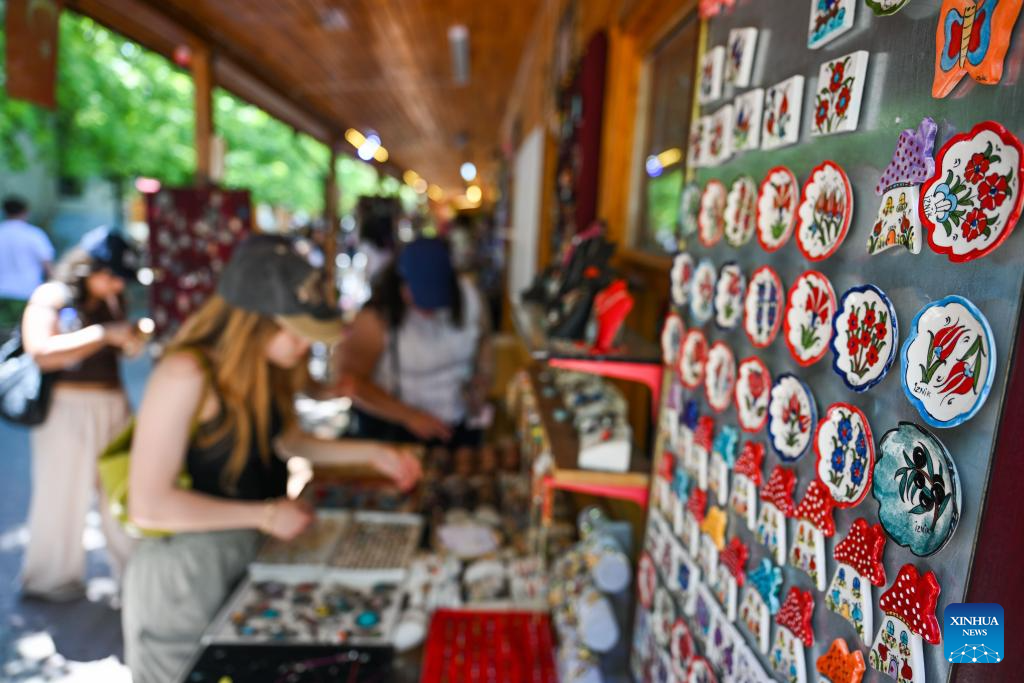
This photo taken on June 16, 2025 shows people visiting the Porcelain Market in Iznik, Türkiye. Walking through the streets of Iznik, Türkiye, one finds ceramic elements everywhere. The clock tower in the city center is adorned with tile murals depicting sailing ships. House numbers on ordinary homes are carefully inscribed on elegant ceramic tiles. Family-run porcelain workshops and ceramic stalls line the streets.
Iznik is known as Türkiye's "porcelain capital." From the 15th to the 17th century, the city flourished as a center for producing blue-and-white porcelain but gradually declined in the following centuries.
In recent years, however, Iznik has been committed to reviving its ceramic heritage and rejuvenating its reputation as Türkiye's "porcelain capital." As part of this effort, Iznik has strengthened exchanges with Jingdezhen, often dubbed China's "porcelain capital."
In 2021, the two porcelain capitals became sister cities, and the Iznik municipal government organized multiple visits to Jingdezhen for study and exchange.
In 2025, Jingdezhen's second official overseas flagship store opened in Türkiye, and the two cities also signed a ceramic industry alliance cooperation agreement. Today, Iznik and Jingdezhen are deepening their ties through ceramics, adding a new layer to the modern story of the Silk Road. (Xinhua/Liu Lei)
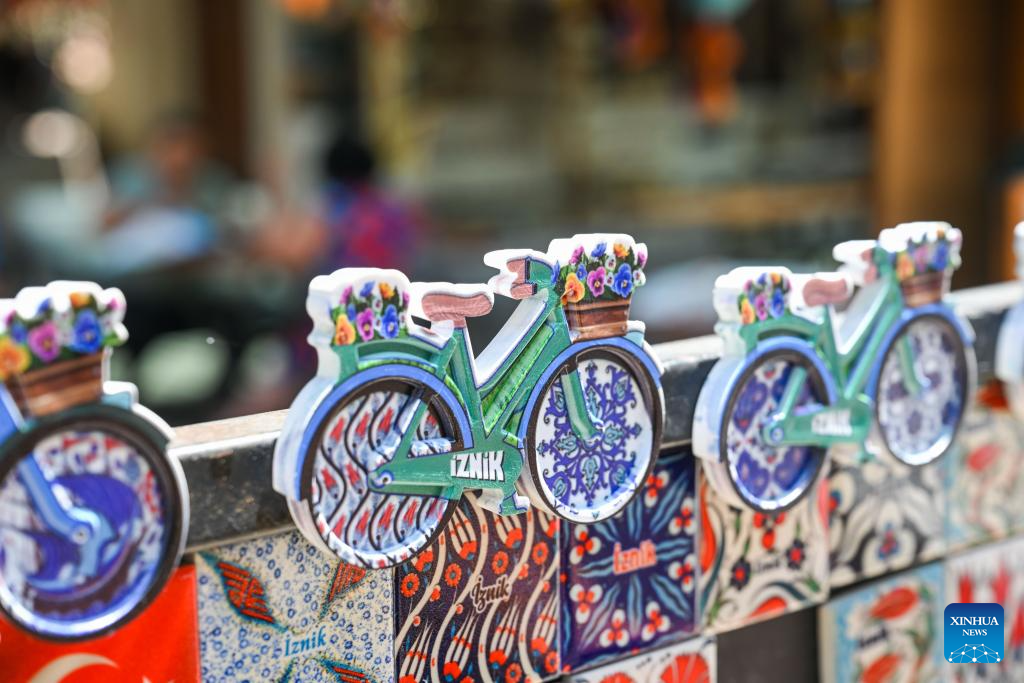
This photo taken on June 26, 2025 shows porcelain-inspired cultural and creative products in a porcelain shop in Iznik,Türkiye. Walking through the streets of Iznik, Türkiye, one finds ceramic elements everywhere. The clock tower in the city center is adorned with tile murals depicting sailing ships. House numbers on ordinary homes are carefully inscribed on elegant ceramic tiles. Family-run porcelain workshops and ceramic stalls line the streets.
Iznik is known as Türkiye's "porcelain capital." From the 15th to the 17th century, the city flourished as a center for producing blue-and-white porcelain but gradually declined in the following centuries.
In recent years, however, Iznik has been committed to reviving its ceramic heritage and rejuvenating its reputation as Türkiye's "porcelain capital." As part of this effort, Iznik has strengthened exchanges with Jingdezhen, often dubbed China's "porcelain capital."
In 2021, the two porcelain capitals became sister cities, and the Iznik municipal government organized multiple visits to Jingdezhen for study and exchange.
In 2025, Jingdezhen's second official overseas flagship store opened in Türkiye, and the two cities also signed a ceramic industry alliance cooperation agreement. Today, Iznik and Jingdezhen are deepening their ties through ceramics, adding a new layer to the modern story of the Silk Road. (Xinhua/Liu Lei)
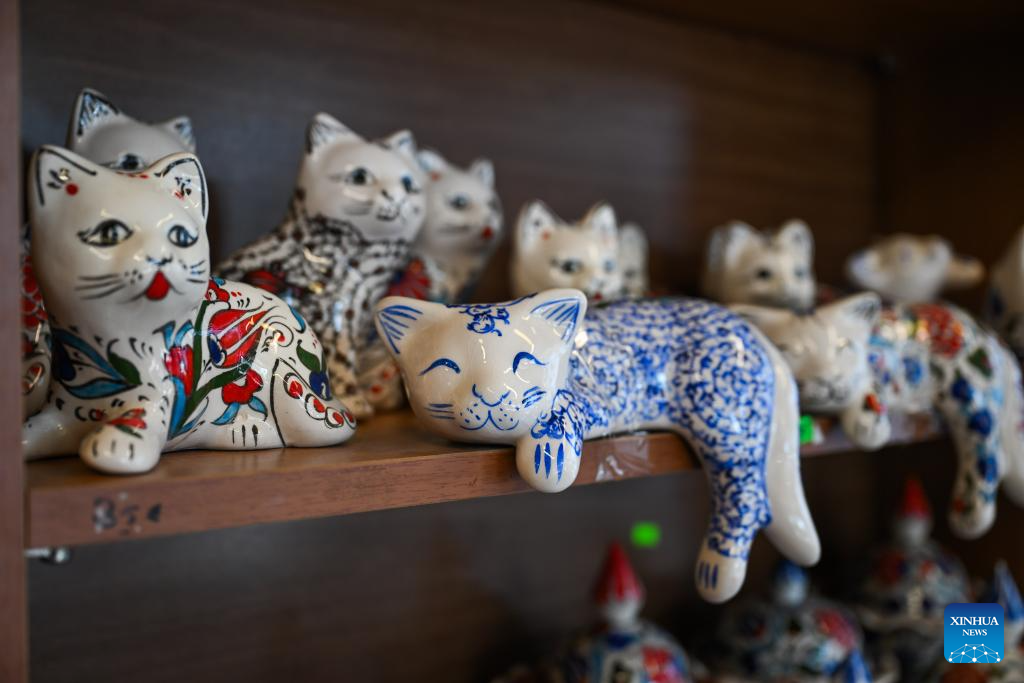
This photo taken on June 16, 2025 shows porcelain-inspired cultural and creative products in a porcelain shop in Iznik,Türkiye. Walking through the streets of Iznik, Türkiye, one finds ceramic elements everywhere. The clock tower in the city center is adorned with tile murals depicting sailing ships. House numbers on ordinary homes are carefully inscribed on elegant ceramic tiles. Family-run porcelain workshops and ceramic stalls line the streets.
Iznik is known as Türkiye's "porcelain capital." From the 15th to the 17th century, the city flourished as a center for producing blue-and-white porcelain but gradually declined in the following centuries.
In recent years, however, Iznik has been committed to reviving its ceramic heritage and rejuvenating its reputation as Türkiye's "porcelain capital." As part of this effort, Iznik has strengthened exchanges with Jingdezhen, often dubbed China's "porcelain capital."
In 2021, the two porcelain capitals became sister cities, and the Iznik municipal government organized multiple visits to Jingdezhen for study and exchange.
In 2025, Jingdezhen's second official overseas flagship store opened in Türkiye, and the two cities also signed a ceramic industry alliance cooperation agreement. Today, Iznik and Jingdezhen are deepening their ties through ceramics, adding a new layer to the modern story of the Silk Road. (Xinhua/Liu Lei)
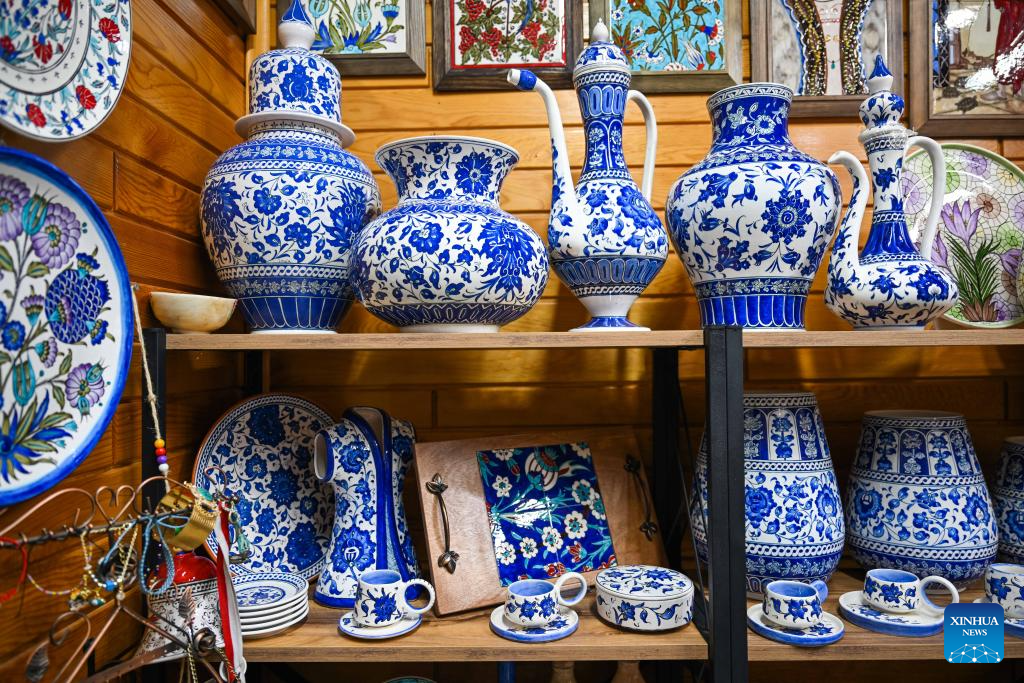
This photo taken on June 16, 2025 shows pocelain ware displayed at the Porcelain Market in Iznik, Türkiye. Walking through the streets of Iznik, Türkiye, one finds ceramic elements everywhere. The clock tower in the city center is adorned with tile murals depicting sailing ships. House numbers on ordinary homes are carefully inscribed on elegant ceramic tiles. Family-run porcelain workshops and ceramic stalls line the streets.
Iznik is known as Türkiye's "porcelain capital." From the 15th to the 17th century, the city flourished as a center for producing blue-and-white porcelain but gradually declined in the following centuries.
In recent years, however, Iznik has been committed to reviving its ceramic heritage and rejuvenating its reputation as Türkiye's "porcelain capital." As part of this effort, Iznik has strengthened exchanges with Jingdezhen, often dubbed China's "porcelain capital."
In 2021, the two porcelain capitals became sister cities, and the Iznik municipal government organized multiple visits to Jingdezhen for study and exchange.
In 2025, Jingdezhen's second official overseas flagship store opened in Türkiye, and the two cities also signed a ceramic industry alliance cooperation agreement. Today, Iznik and Jingdezhen are deepening their ties through ceramics, adding a new layer to the modern story of the Silk Road. (Xinhua/Liu Lei)
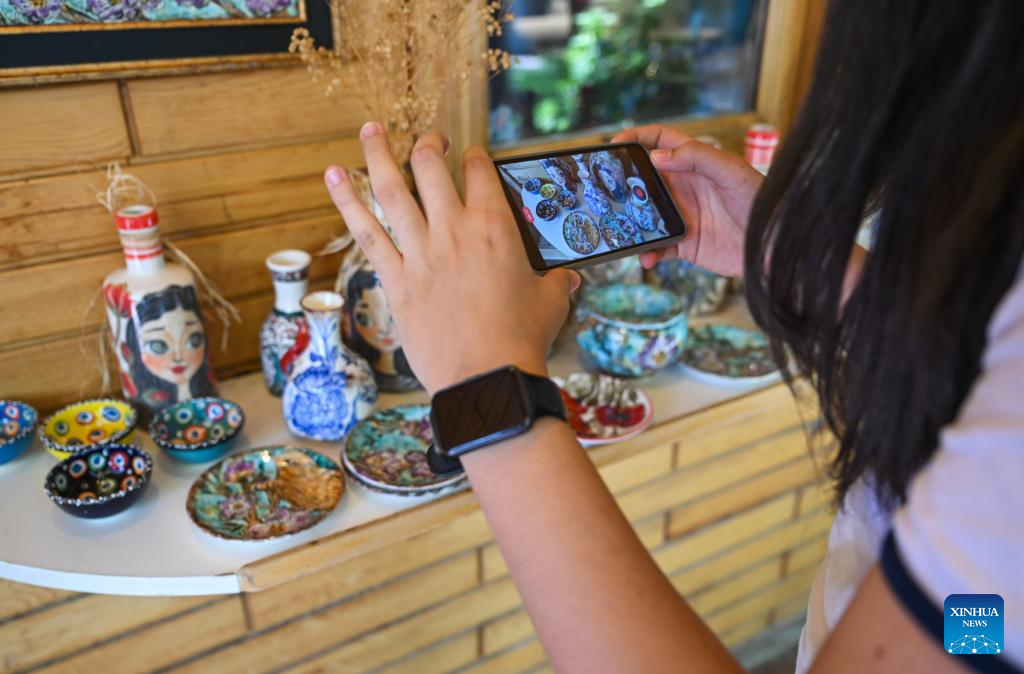
A tourist takes photos of porcelain ware at the Porcelain Market in Iznik, Türkiye, on June 16, 2025. Walking through the streets of Iznik, Türkiye, one finds ceramic elements everywhere. The clock tower in the city center is adorned with tile murals depicting sailing ships. House numbers on ordinary homes are carefully inscribed on elegant ceramic tiles. Family-run porcelain workshops and ceramic stalls line the streets.
Iznik is known as Türkiye's "porcelain capital." From the 15th to the 17th century, the city flourished as a center for producing blue-and-white porcelain but gradually declined in the following centuries.
In recent years, however, Iznik has been committed to reviving its ceramic heritage and rejuvenating its reputation as Türkiye's "porcelain capital." As part of this effort, Iznik has strengthened exchanges with Jingdezhen, often dubbed China's "porcelain capital."
In 2021, the two porcelain capitals became sister cities, and the Iznik municipal government organized multiple visits to Jingdezhen for study and exchange.
In 2025, Jingdezhen's second official overseas flagship store opened in Türkiye, and the two cities also signed a ceramic industry alliance cooperation agreement. Today, Iznik and Jingdezhen are deepening their ties through ceramics, adding a new layer to the modern story of the Silk Road. (Xinhua/Liu Lei)
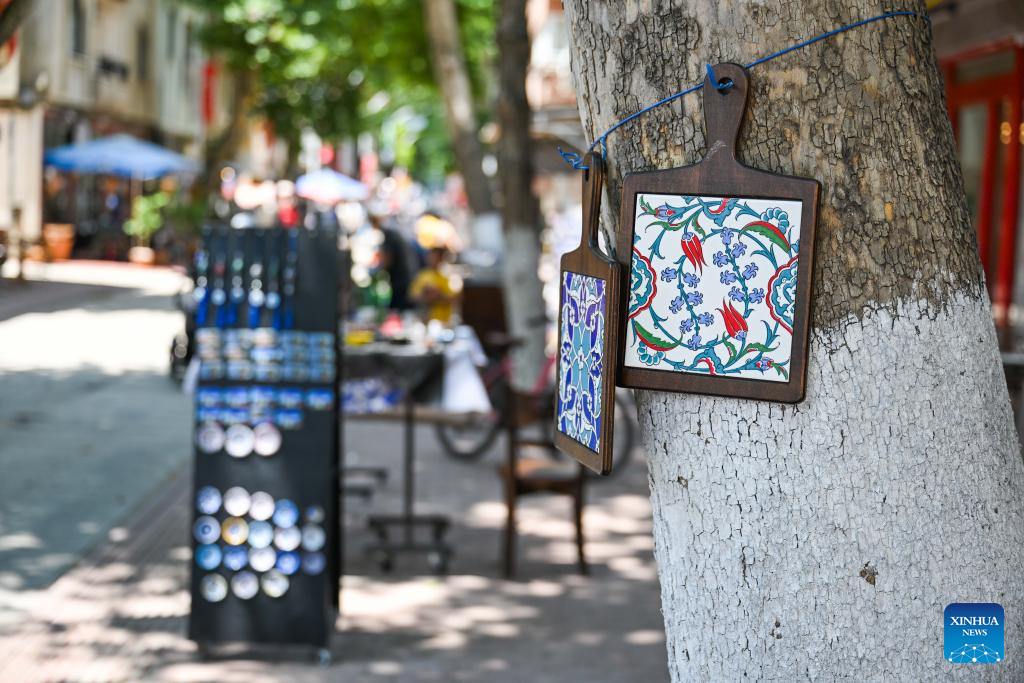
This photo taken on June 16, 2025 shows a porcelain stall on a street in Iznik, Türkiye. Walking through the streets of Iznik, Türkiye, one finds ceramic elements everywhere. The clock tower in the city center is adorned with tile murals depicting sailing ships. House number plates on ordinary homes are carefully inscribed on elegant ceramic tiles. Family-run porcelain workshops and ceramic stalls line the streets.
Iznik is known as Türkiye's "porcelain capital." From the 15th to the 17th century, the city flourished as a center for producing blue-and-white porcelain but gradually declined in the following centuries.
In recent years, however, Iznik has been committed to reviving its ceramic heritage and rejuvenating its reputation as Türkiye's "porcelain capital." As part of this effort, Iznik has strengthened exchanges with Jingdezhen, often dubbed China's "porcelain capital."
In 2021, the two porcelain capitals became sister cities, and the Iznik municipal government organized multiple visits to Jingdezhen for study and exchange.
In 2025, Jingdezhen's second official overseas flagship store opened in Türkiye, and the two cities also signed a ceramic industry alliance cooperation agreement. Today, Iznik and Jingdezhen are deepening their ties through ceramics, adding a new layer to the modern story of the Silk Road. (Xinhua/Liu Lei)
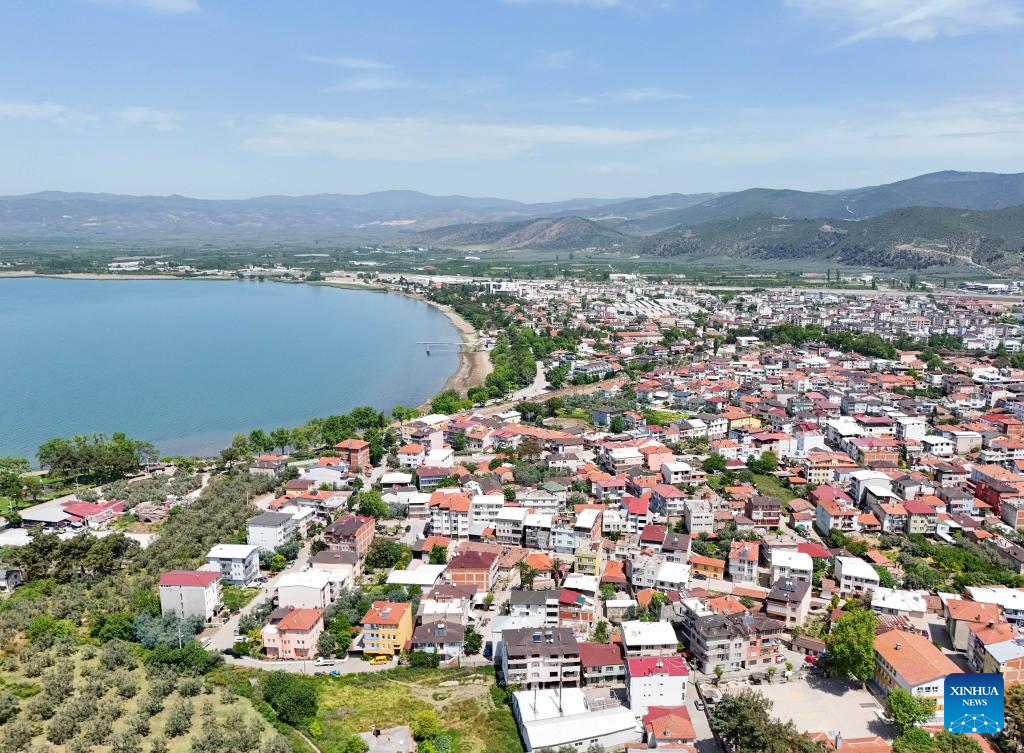
An aerial drone photo taken on May 9, 2025 shows a view of Iznik, Türkiye. Walking through the streets of Iznik, Türkiye, one finds ceramic elements everywhere. The clock tower in the city center is adorned with tile murals depicting sailing ships. House numbers on ordinary homes are carefully inscribed on elegant ceramic tiles. Family-run porcelain workshops and ceramic stalls line the streets.
Iznik is known as Türkiye's "porcelain capital." From the 15th to the 17th century, the city flourished as a center for producing blue-and-white porcelain but gradually declined in the following centuries.
In recent years, however, Iznik has been committed to reviving its ceramic heritage and rejuvenating its reputation as Türkiye's "porcelain capital." As part of this effort, Iznik has strengthened exchanges with Jingdezhen, often dubbed China's "porcelain capital."
In 2021, the two porcelain capitals became sister cities, and the Iznik municipal government organized multiple visits to Jingdezhen for study and exchange.
In 2025, Jingdezhen's second official overseas flagship store opened in Türkiye, and the two cities also signed a ceramic industry alliance cooperation agreement. Today, Iznik and Jingdezhen are deepening their ties through ceramics, adding a new layer to the modern story of the Silk Road. (Xinhua/Liu Lei)
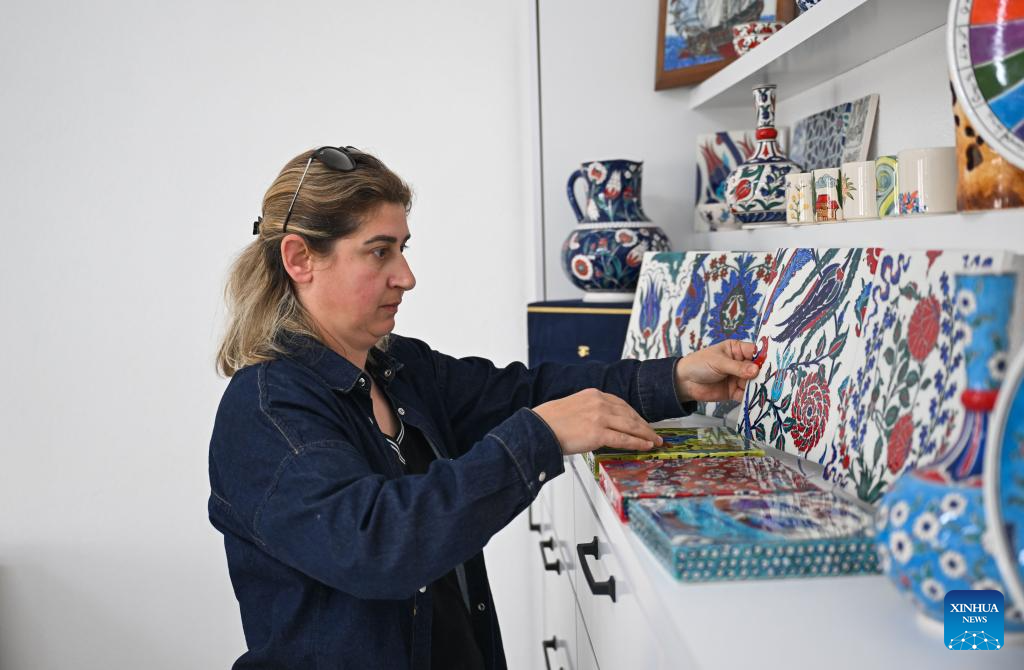
A worker arranges porcelain products in a family porcelain workshop in Iznik, Türkiye, on May 9, 2025. Walking through the streets of Iznik, Türkiye, one finds ceramic elements everywhere. The clock tower in the city center is adorned with tile murals depicting sailing ships. House numbers on ordinary homes are carefully inscribed on elegant ceramic tiles. Family-run porcelain workshops and ceramic stalls line the streets.
Iznik is known as Türkiye's "porcelain capital." From the 15th to the 17th century, the city flourished as a center for producing blue-and-white porcelain but gradually declined in the following centuries.
In recent years, however, Iznik has been committed to reviving its ceramic heritage and rejuvenating its reputation as Türkiye's "porcelain capital." As part of this effort, Iznik has strengthened exchanges with Jingdezhen, often dubbed China's "porcelain capital."
In 2021, the two porcelain capitals became sister cities, and the Iznik municipal government organized multiple visits to Jingdezhen for study and exchange.
In 2025, Jingdezhen's second official overseas flagship store opened in Türkiye, and the two cities also signed a ceramic industry alliance cooperation agreement. Today, Iznik and Jingdezhen are deepening their ties through ceramics, adding a new layer to the modern story of the Silk Road. (Xinhua/Liu Lei)
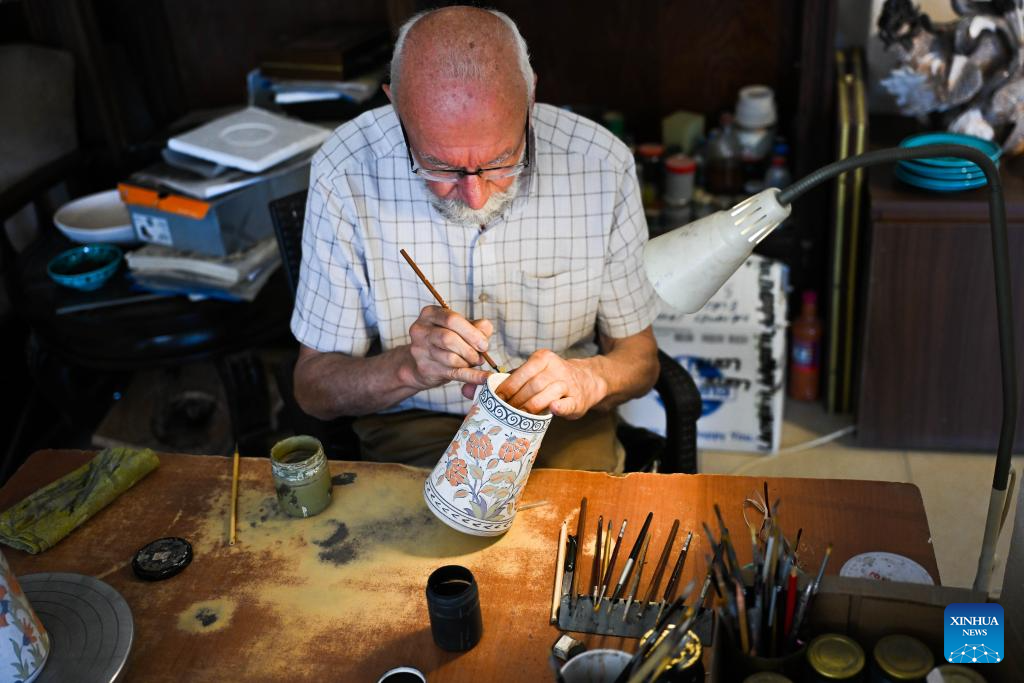
Turkish ceramic artist Adil Can Guven works in his studio in Iznik, Türkiye on June 26, 2025. Walking through the streets of Iznik, Türkiye, one finds ceramic elements everywhere. The clock tower in the city center is adorned with tile murals depicting sailing ships. House numbers on ordinary homes are carefully inscribed on elegant ceramic tiles. Family-run porcelain workshops and ceramic stalls line the streets.
Iznik is known as Türkiye's "porcelain capital." From the 15th to the 17th century, the city flourished as a center for producing blue-and-white porcelain but gradually declined in the following centuries.
In recent years, however, Iznik has been committed to reviving its ceramic heritage and rejuvenating its reputation as Türkiye's "porcelain capital." As part of this effort, Iznik has strengthened exchanges with Jingdezhen, often dubbed China's "porcelain capital."
In 2021, the two porcelain capitals became sister cities, and the Iznik municipal government organized multiple visits to Jingdezhen for study and exchange.
In 2025, Jingdezhen's second official overseas flagship store opened in Türkiye, and the two cities also signed a ceramic industry alliance cooperation agreement. Today, Iznik and Jingdezhen are deepening their ties through ceramics, adding a new layer to the modern story of the Silk Road. (Xinhua/Liu Lei)
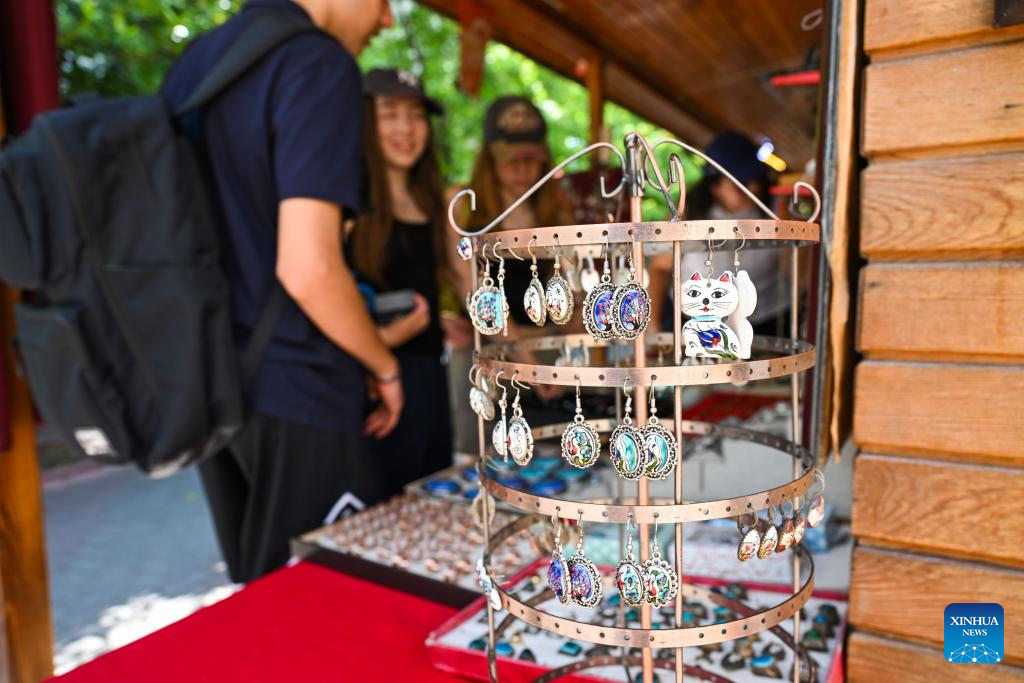
This photo taken on June 16, 2025 shows porcelain products displayed at the Porcelain Market in Iznik, Türkiye. Walking through the streets of Iznik, Türkiye, one finds ceramic elements everywhere. The clock tower in the city center is adorned with tile murals depicting sailing ships. House numbers on ordinary homes are carefully inscribed on elegant ceramic tiles. Family-run porcelain workshops and ceramic stalls line the streets.
Iznik is known as Türkiye's "porcelain capital." From the 15th to the 17th century, the city flourished as a center for producing blue-and-white porcelain but gradually declined in the following centuries.
In recent years, however, Iznik has been committed to reviving its ceramic heritage and rejuvenating its reputation as Türkiye's "porcelain capital." As part of this effort, Iznik has strengthened exchanges with Jingdezhen, often dubbed China's "porcelain capital."
In 2021, the two porcelain capitals became sister cities, and the Iznik municipal government organized multiple visits to Jingdezhen for study and exchange.
In 2025, Jingdezhen's second official overseas flagship store opened in Türkiye, and the two cities also signed a ceramic industry alliance cooperation agreement. Today, Iznik and Jingdezhen are deepening their ties through ceramics, adding a new layer to the modern story of the Silk Road. (Xinhua/Liu Lei)
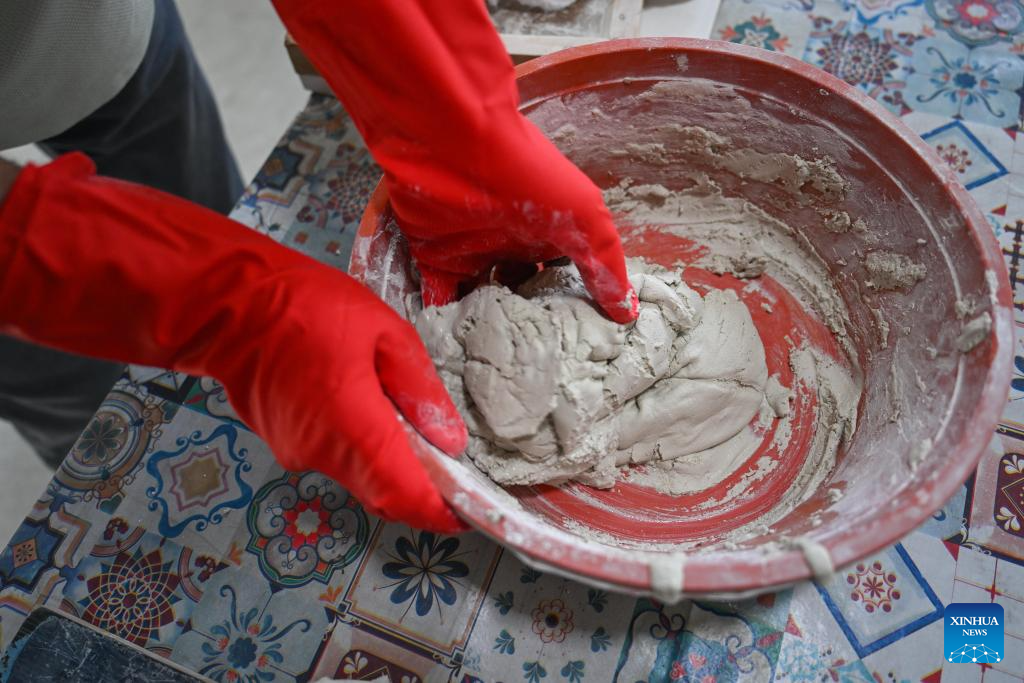
A worker stirs raw clay for making porcelain in a family porcelain workshop in Iznik, Türkiye, on May 9, 2025. Walking through the streets of Iznik, Türkiye, one finds ceramic elements everywhere. The clock tower in the city center is adorned with tile murals depicting sailing ships. House numbers on ordinary homes are carefully inscribed on elegant ceramic tiles. Family-run porcelain workshops and ceramic stalls line the streets.
Iznik is known as Türkiye's "porcelain capital." From the 15th to the 17th century, the city flourished as a center for producing blue-and-white porcelain but gradually declined in the following centuries.
In recent years, however, Iznik has been committed to reviving its ceramic heritage and rejuvenating its reputation as Türkiye's "porcelain capital." As part of this effort, Iznik has strengthened exchanges with Jingdezhen, often dubbed China's "porcelain capital."
In 2021, the two porcelain capitals became sister cities, and the Iznik municipal government organized multiple visits to Jingdezhen for study and exchange.
In 2025, Jingdezhen's second official overseas flagship store opened in Türkiye, and the two cities also signed a ceramic industry alliance cooperation agreement. Today, Iznik and Jingdezhen are deepening their ties through ceramics, adding a new layer to the modern story of the Silk Road. (Xinhua/Liu Lei)
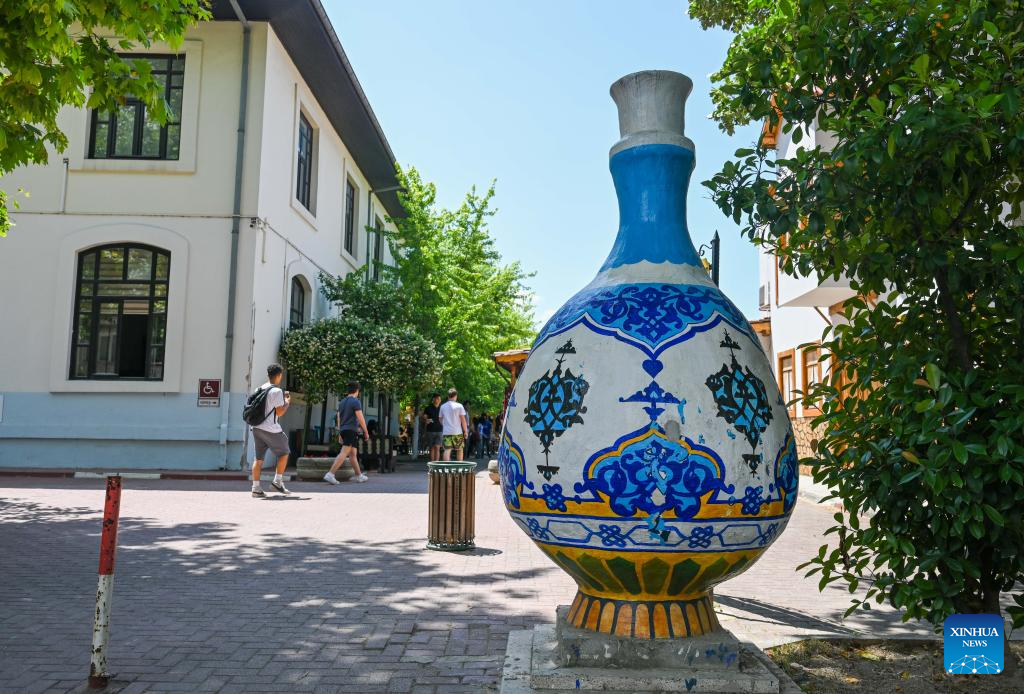
This photo taken on June 16, 2025 shows an entrance to the Porcelain Market in Iznik, Türkiye. Walking through the streets of Iznik, Türkiye, one finds ceramic elements everywhere. The clock tower in the city center is adorned with tile murals depicting sailing ships. House numbers on ordinary homes are carefully inscribed on elegant ceramic tiles. Family-run porcelain workshops and ceramic stalls line the streets.
Iznik is known as Türkiye's "porcelain capital." From the 15th to the 17th century, the city flourished as a center for producing blue-and-white porcelain but gradually declined in the following centuries.
In recent years, however, Iznik has been committed to reviving its ceramic heritage and rejuvenating its reputation as Türkiye's "porcelain capital." As part of this effort, Iznik has strengthened exchanges with Jingdezhen, often dubbed China's "porcelain capital."
In 2021, the two porcelain capitals became sister cities, and the Iznik municipal government organized multiple visits to Jingdezhen for study and exchange.
In 2025, Jingdezhen's second official overseas flagship store opened in Türkiye, and the two cities also signed a ceramic industry alliance cooperation agreement. Today, Iznik and Jingdezhen are deepening their ties through ceramics, adding a new layer to the modern story of the Silk Road. (Xinhua/Liu Lei)
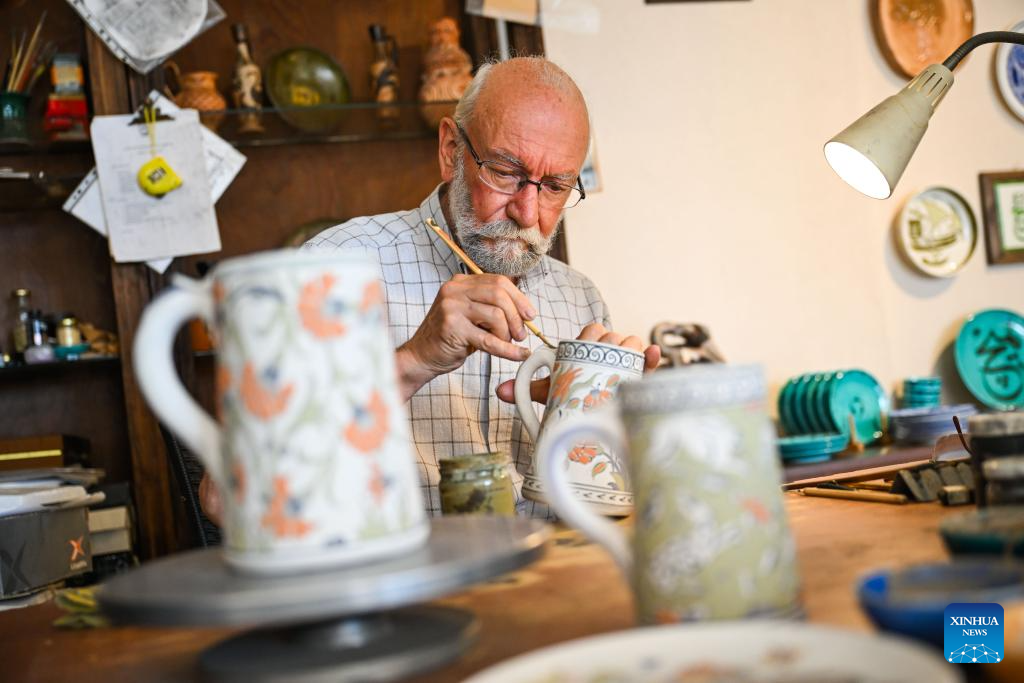
Turkish ceramic artist Adil Can Guven works in his studio in Iznik, Türkiye on June 26, 2025. Walking through the streets of Iznik, Türkiye, one finds ceramic elements everywhere. The clock tower in the city center is adorned with tile murals depicting sailing ships. House numbers on ordinary homes are carefully inscribed on elegant ceramic tiles. Family-run porcelain workshops and ceramic stalls line the streets.
Iznik is known as Türkiye's "porcelain capital." From the 15th to the 17th century, the city flourished as a center for producing blue-and-white porcelain but gradually declined in the following centuries.
In recent years, however, Iznik has been committed to reviving its ceramic heritage and rejuvenating its reputation as Türkiye's "porcelain capital." As part of this effort, Iznik has strengthened exchanges with Jingdezhen, often dubbed China's "porcelain capital."
In 2021, the two porcelain capitals became sister cities, and the Iznik municipal government organized multiple visits to Jingdezhen for study and exchange.
In 2025, Jingdezhen's second official overseas flagship store opened in Türkiye, and the two cities also signed a ceramic industry alliance cooperation agreement. Today, Iznik and Jingdezhen are deepening their ties through ceramics, adding a new layer to the modern story of the Silk Road. (Xinhua/Liu Lei)



